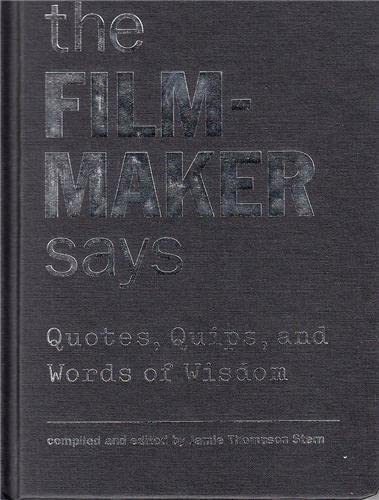
Editor Jamie Thompson Stern informs in the preface she has compiled and arranged (unsourced) quotes about filmmaking from “directors, screenwriters, producers, cinematographers, studio heads, actors, and critics…in such a way as to show lively conversations among filmmakers from different eras and with wildly sensibilities.”
The presentation of contradicting ideas is what makes The Filmmaker Says most interesting because it hints at screenwriter William Goldman’s famous line “nobody knows anything,” which is included here. Preston Sturges thinks he knows something because he offers “Eleven Rules for Box Office Appeal,” but Frank Capra is quick to point out on the following page that “there are no rules in filmmaking.” Jean-Luc Godard declares “the cinema is truth twenty-four frames a second,” but Brian De Palma states the exact opposite: “film lies twenty-four times a second.”
The book also allows readers to see different director’s attitudes and approaches to filmmaking. George Cukor says, “Give me a good script, and I’ll be hundred times better as a director,” John Ford dismisses the notion because “there’s no such thing as a good script, really.” Michelangelo Antonioni claims to “have no preconceived ideas of how the scene should be done” before showing up on set while Peter Jackson develops a “virtual mental image” before arriving.
There are some missed opportunities because some quotes speak to other filmmakers’ work yet they don’t get a chance to respond regardless if the quote was directed at them. A great example is from John Huston who says, “If you make movies about movies and about characters instead of people, the echoes get thinner and thinner until they’re reduced to mechanical sounds.” While Huston died in 1987, it certainly seems to speak to Quentin Tarantino’s work yet no rebuttal is offered.
In The Filmmaker Says, there are nearly 150 quotes that offer great food for thought regarding both the art and business of making movies. Although the one-and-done style more closely resembles a website’s comment thread than it does a conversation, the book is a great read for those intrigued by those who make films intriguing.